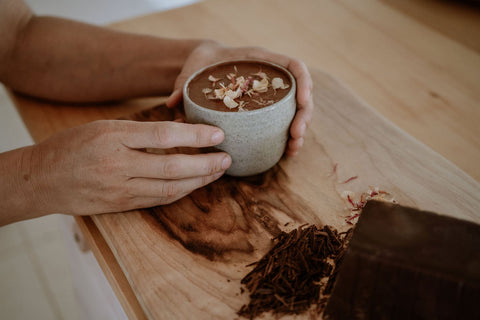All About Ceremonial Cacao and its benefits
HISTORY
Cacao originates from Mexico, where the Mayas, Incas and Aztecs considered it the food of the gods. Cacao is the seed of a fruit of an indigenous American jungle tree. It is in season at all times, producing fruit all year long. Cacao flowers develop into a pod fruit, which can take up to 6 months to ripen. They can grow anywhere from 7 to 8 inches long with each pod containing up to 50 almond-like seeds, or beans. It is these sees that we call “the food of the gods” or cacao beans.

Aztecs favoured cacao beans over gold as their money source with their warehouse holding more than 40,000 loads, which would mean 960,000,000 beans! Emperor Montezuma’s royal coffers were overflowing, not with gold, but with cacao beans.
Over the years many chemists manufactured all types of chocolate products from, low fat powders to solid forms like chocolate bars. In 1867, Nestle discovered a process to powder milk by evaporation and in 1879, the first milk chocolate bar was produced.
BENEFITS
Like all superfoods, chocolate can be used as a food and a potent and beneficial medicine.
Its mineral content and unique properties are best consumed in its raw form as heating and processing diminishes its medicinal benefits.

Cacao boasts a wide range of minerals that can be highly accessible in just one small serving of cacao, these include:
Magnesium- Supports the heart, nervous system and muscles
Iron- Supports the blood and immune system
Chromium- Balances blood sugar levels
Manganese- Assists iron in the oxygenation of the blood
Zinc- Immunity, sexual health and skin
Calcium- Supports bone health, Muscle contraction, heart health and nerve health.
Copper- Helps to build healthy blood and strong immunity
Phosphorus- For the formation of bones and teeth
Potassium- Electrolyte for nerves to function and muscles to contract.
Antioxidants:
Cacao has been found to have a much higher antioxidant capacity per serving, than black tea, green tea or red wine. Cacao Polyphenols are far greater than synthetic antioxidants and has consistently shown protection against oxidation and buffer free radicals in both vitro and in vivo studies.
Long term cacao ingestion appears to lead to an increased resistance to UV- induced skin redness. 10 healthy women taking just one dose of flavanol rich cacao was found to enhance dermal blood flow and elevate oxygen saturation of haemoglobin just 2 hrs after consumption. A two week study found higher levels of skin density, skin hydration and skin thickness with decreased skin roughness.
Psychological effects:
Phenylethylamine- Is found in abundance within cacao when it hasn’t been heated. PEAs are a major class of chemicals that we produce in our bodies when we fall in love. PEAs also play a role in increasing focus and attention.
A group of biologically active constituents have been identified in cacao and appear to be related to anandamine, the “internal bliss” chemical, which is a cannabinoid endorphin that the human body naturally produces after exercise.
Tryptophan- Cacao powder can contain between 0.2 – 0.5 percent tryptophan. Tryptophan is an amino acid essential for the production of serotonin, our primary neurotransmitter which helps us build up our stress defence shield and makes us feel good.
Physical Benefits:
Teeth- Theobromine, like caffeine, but not anywhere near your average coffee drink. Cacaos caffeine content is sitting at about 1/20th of the caffeine present in conventional coffee. Theobromine is an effective antibacterial substance that kills streptococcus mutans, the common bacteria that causes decay in teeth. In vitro experiments, polyphenols and tannis from cacao interfered with glucosyltransferase activity of streptococcus mutans and reduce plaque formation.
Digestion- Cacao has been shown to increase bifidobacterial and lactobacilli microflora and reduced constipation in paediatric patients. Cacaos high flavanol and fibre content has beneficial effects on the metabolism and cleansing of the colon.
Brain/Heart health- Swedish women reviewed over a 10yr period suggested that their high cacao consumption reduced their risk of stroke. Human studies suggest cacao consumption may have clinical benefits for dementia, stroke, and being associated with a significant increase in brain blood flow velocity. Cacao has amazing heart benefits, with studies supporting its use in helping the heart muscles to pump blood more effectively and reducing the risk of Myocardial ischemia due to its many cardioprotective traits.

This article was written by our Naturopath - Tanya Adams
Photographs by Amber Light Photography




Leave a comment